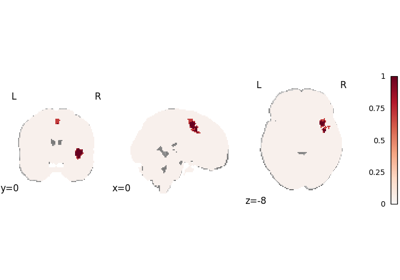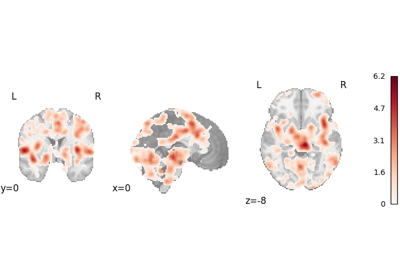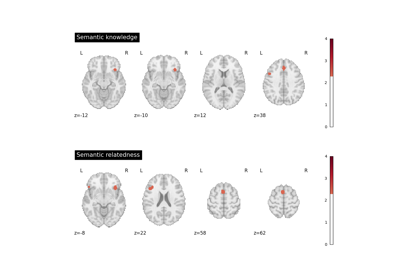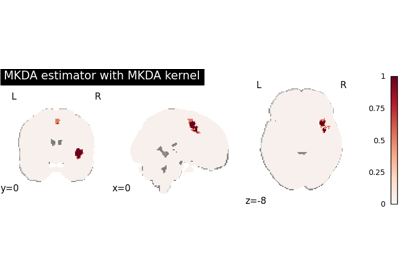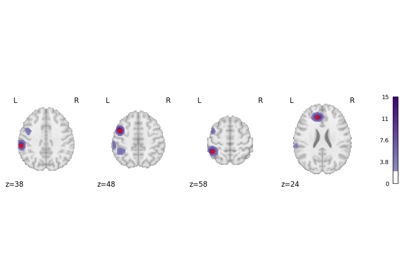nimare.meta.cbma.base.CBMAEstimator
- class CBMAEstimator(kernel_transformer, *args, **kwargs)[source]
Bases:
nimare.base.MetaEstimatorBase class for coordinate-based meta-analysis methods.
Changed in version 0.0.8:
[REF] Use saved MA maps, when available.
[REF] Add low_memory option.
New in version 0.0.3.
- Parameters
kernel_transformer (
KernelTransformer, optional) – Kernel with which to convolve coordinates from dataset. Default is ALEKernel.*args – Optional arguments to the
MetaEstimator__init__ (called automatically).**kwargs – Optional keyword arguments to the
MetaEstimator__init__ (called automatically).
- compute_summarystat(data)[source]
Compute summary statistics from data.
The actual summary statistic varies across Estimators. For ALE and SCALE, the values are known as ALE values. For (M)KDA, they are “OF” scores.
- Parameters
data (array, pandas.DataFrame, or list of img_like) – Data from which to estimate summary statistics. The data can be: (1) a 1d contrast-len or 2d contrast-by-voxel array of MA values, (2) a DataFrame containing coordinates to produce MA values, or (3) a list of imgs containing MA values.
- Returns
stat_values (1d array) – Summary statistic values. One value per voxel.
- correct_fwe_montecarlo(result, voxel_thresh=0.001, n_iters=10000, n_cores=- 1, vfwe_only=False)[source]
Perform FWE correction using the max-value permutation method.
Only call this method from within a Corrector.
Changed in version 0.0.11:
Rename
*_level-clustermaps to*_desc-size_level-cluster.Add new
*_desc-mass_level-clustermaps that use cluster mass-based inference.
- Parameters
result (
MetaResult) – Result object from a CBMA meta-analysis.voxel_thresh (
float, optional) – Cluster-defining p-value threshold. Default is 0.001.n_iters (
int, optional) – Number of iterations to build the voxel-level, cluster-size, and cluster-mass FWE null distributions. Default is 10000.n_cores (
int, optional) – Number of cores to use for parallelization. If <=0, defaults to using all available cores. Default is -1.vfwe_only (
bool, optional) – If True, only calculate the voxel-level FWE-corrected maps. Voxel-level correction can be performed very quickly if the Estimator’snull_methodwas “montecarlo”. If this is set to True and the original null method was not montecarlo, an exception will be raised. Default is False.
- Returns
images (
dict) – Dictionary of 1D arrays corresponding to masked images generated by the correction procedure. The following arrays are generated by this method:logp_desc-size_level-cluster: Cluster-level FWE-corrected-log10(p)map based on cluster size. This was previously simply called “logp_level-cluster”. This array is not generated ifvfwe_onlyisTrue.logp_desc-mass_level-cluster: Cluster-level FWE-corrected-log10(p)map based on cluster mass. According to 1 and 2, cluster mass-based inference is more powerful than cluster size. This array is not generated ifvfwe_onlyisTrue.logp_level-voxel: Voxel-level FWE-corrected-log10(p)map. Voxel-level correction is generally more conservative than cluster-level correction, so it is only recommended for very large meta-analyses (i.e., hundreds of studies), per 3.
Notes
If
vfwe_onlyisFalse, this method adds three new keys to thenull_distributions_attribute:values_level-voxel_corr-fwe_method-montecarlo: The maximum summary statistic value from each Monte Carlo iteration. An array of shape (n_iters,).values_desc-size_level-cluster_corr-fwe_method-montecarlo: The maximum cluster size from each Monte Carlo iteration. An array of shape (n_iters,).values_desc-mass_level-cluster_corr-fwe_method-montecarlo: The maximum cluster mass from each Monte Carlo iteration. An array of shape (n_iters,).
See also
nimare.correct.FWECorrectorThe Corrector from which to call this method.
References
- 1
Bullmore, E. T., Suckling, J., Overmeyer, S., Rabe-Hesketh, S., Taylor, E., & Brammer, M. J. (1999). Global, voxel, and cluster tests, by theory and permutation, for a difference between two groups of structural MR images of the brain. IEEE transactions on medical imaging, 18(1), 32-42. doi: 10.1109/42.750253
- 2
Zhang, H., Nichols, T. E., & Johnson, T. D. (2009). Cluster mass inference via random field theory. Neuroimage, 44(1), 51-61. doi: 10.1016/j.neuroimage.2008.08.017
- 3
Eickhoff, S. B., Nichols, T. E., Laird, A. R., Hoffstaedter, F., Amunts, K., Fox, P. T., … & Eickhoff, C. R. (2016). Behavior, sensitivity, and power of activation likelihood estimation characterized by massive empirical simulation. Neuroimage, 137, 70-85. doi: 10.1016/j.neuroimage.2016.04.072
Examples
>>> meta = MKDADensity() >>> result = meta.fit(dset) >>> corrector = FWECorrector(method='montecarlo', voxel_thresh=0.01, n_iters=5, n_cores=1) >>> cresult = corrector.transform(result)
- fit(dataset, drop_invalid=True)[source]
Fit Estimator to Dataset.
- Parameters
- Returns
MetaResult– Results of Estimator fitting.- Variables
inputs_ (
dict) – Inputs used in _fit.
Notes
The
fitmethod is a light wrapper that runs input validation and preprocessing before fitting the actual model. Estimators’ individual “fitting” methods are implemented as_fit, although users should callfit.
